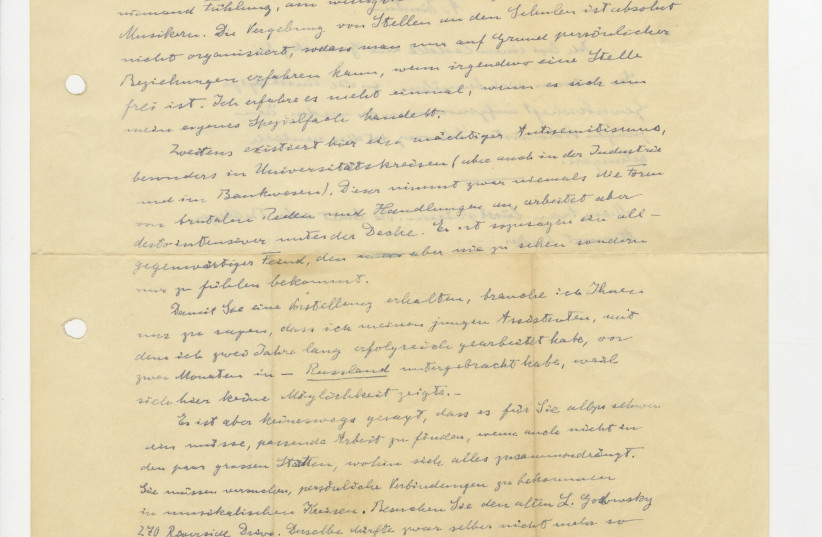A recently discovered letter penned by renowned physicist Albert Einstein brings to light some of the inconspicuous antisemitism – particularly in academia and arts – that Einstein and other Jewish cohorts faced in the United States after fleeing Germany for precisely that reason.
Einstein addressed his letter – which will be auctioned by Kedem Auction House this Tuesday, November 23 – to Austrian-Jewish pianist Bruno Eisner, who inquired about life in the United States as he looked to settle after leaving Nazi-ruled Europe.
”There exists here a tremendous (degree of) anti-Semitism, especially in academia (though also in industry and banking). Mind you, this (anti-Semitism) never takes the form of brutal speech or action, but rather, it brews, all the more intensely, under the surface. It is, so to speak, an omnipresent enemy, one that is impossible to see, (whose presence) you only perceive,” wrote Einstein, who addressed Eisner’s inquiry about the ability to find work in the US.
“I am not informed (of a vacancy) even when it falls under my own specialty,” the celebrated scientist admitted in the German-language letter, which was translated to English.

Einstein also provided the story of one of his assistants as an example of his warnings, writing “I only need to tell you that my young assistant, with whom I have worked successfully for two years, settled in Russia two months ago, because there were no opportunities here.”
The letter, written when Einstein was living in Princeton, New Jersey, several years after the Nazi rise to power, sheds light on the antisemitism faced by Jews living in America at the time. While incomparable in scale, the troubling pattern of marginalization and discrimination followed Einstein and other Jews who arrived on America’s shores.
Eisner, who was already in New York at the time of the letter, eventually succeeded in the American classical music scene, with a career as a concert pianist and professor of music. He died at age 94 in New York.
Einstein, who is widely acknowledged to be one of the greatest-ever physicists, is best known for developing the theory of relativity, though he also made important contributions to the development of the theory of quantum mechanics. His scientific discoveries were crucial in the development of the atomic bomb, which subsequently helped lead to the end of World War II.
When the Nazis began to marginalize Jews of esteemed positions in Germany, such as in the fields of public office and university work, Einstein – and his revolutionary theory of relativity – was targeted by the Nazis, who dismissed his theory as "Jewish Physics." Einstein, who had been conducting research in the US since 1933 – the year the Nazis rose to power – later renounced his citizenship, promising to never return to his native Germany. He gained US citizenship in 1940.
“This letter sheds light on a lesser-known aspect of Einstein's life in the United States,” said Meron Eren, Kedem Auction House CEO and co-founder. "At the time, antisemitism in the US was largely overshadowed by the Holocaust and the millions who died in Europe."
“This letter serves as another important reminder that liberal societies are not immune to this disease and that we must always stay vigilant against any form of racism,” Eren concluded.
